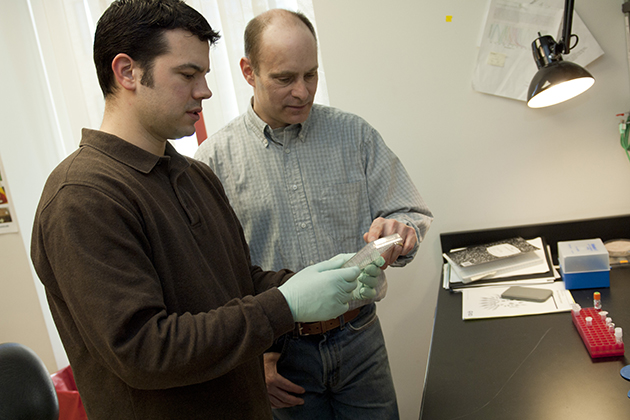The University of Connecticut has announced a new stem cell research collaboration in the field of rare disease with Cheshire, Conn.-based Alexion Pharmaceuticals Inc. (NASDAQ: ALXN). The research collaboration will focus on the discovery and testing of therapeutic candidates to treat rare and disabling disorders for which there are currently no effective treatments.

The collaboration will expand on the work of David Goldhamer, professor of molecular and cell biology and associate director of the UConn Stem Cell Institute. Goldhamer has identified the offending progenitor cell type that drives the pathology of a group of diseases, and has developed physiologically relevant disease models. These models will be used to further understand the pathophysiology of these disorders, and to test potential therapeutics.
“This collaboration targets unmet medical needs for patients, while demonstrating the vitality of the life science community in Connecticut,” said Jeff Seemann, UConn’s vice president for research. “As part of Connecticut’s flagship public university and a top 20 public research institution, UConn’s faculty routinely offers tools and expertise that fuel the innovative needs of industry, and that are critically necessary to industry’s ability to succeed in today’s highly competitive global marketplace.”
UConn includes a vibrant, integrated academic medical center that is growing strongly in all three areas of its mission: academics, research, and clinical care. Alexion is a leading global biopharmaceutical company, based in Connecticut, with established expertise in the development and delivery of life-transforming therapies for patients with severe and life-threatening diseases.
“We are pleased to work with UConn on this promising program on behalf of patients with severe and rare disorders for which there are no effective treatment options,” said Martin Mackay, executive vice president and global head of R&D at Alexion. “We look forward to a highly interactive and collaborative process, utilizing UConn’s expertise and capacity to accelerate our efforts in this important area of research.”

This is a meaningful development under the Connecticut Regenerative Medicine Research Grants Program, and a significant collaboration between UConn and a leading life sciences company. The state program was enacted to position Connecticut at the forefront of this promising field of medical science, and has provided world-class stem cell research capacity at UConn. The work to be performed will support both the research interests of Alexion and the education of a new generation of life scientists, as students, graduate students, and post-doctoral researchers will participate under Goldhamer’s direction.
“Our collaboration with Alexion will provide an exciting opportunity for important research in debilitating rare diseases, and is well aligned with the goals of Next Generation Connecticut, the state’s plan to expand educational opportunities, research, and innovation in science, technology, engineering, and math (STEM) over the next decade,” said UConn President Susan Herbst.
Alexion is a global biopharmaceutical company focused on developing and delivering life-transforming therapies for patients with severe and life-threatening diseases. It was established in the U.S. in 1992, and the company’s current global headquarters and research operations are in Cheshire, Conn. Alexion’s more than 2,200 employees serve patients in nearly 50 countries. The company plans to move its global headquarters to New Haven, Conn. in 2015.
Connecticut was one of the first states to fund stem cell research. UConn faculty and spin-out companies have been awarded $37.25 million since the state stem cell funding program was launched in 2006.



